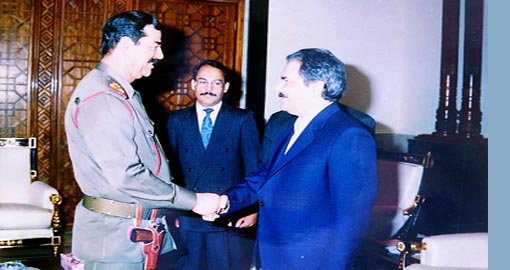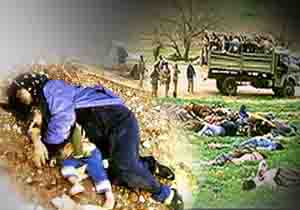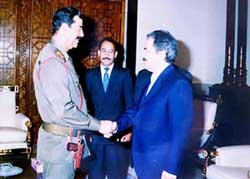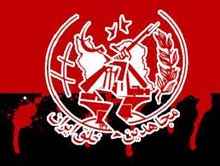In order to investigate the various aspects of the crimes of the terrorist group of the Mujahedin-e Khalq (MEK) in the genocide of the Iraqi Kurds in 1991 and cooperation with Saddam in the massacre of the people of Iran, the Terrorspring Foundation organized an international conference on “Crime against humanity: Genocide of Iraqi Kurds by the MEK” on 1st and 2nd of March 2023.
On the first day of this international conference, speakers from Iran, Iraq and Italy gave speeches, they were Dr. Alireza Abedini, head of the Yassin think tank from Iran, Mr. Ibrahim al-Seraj, head of the Association for the Defense of Journalists’ Rights from Iraq, Professor Lorenzo Maria Pacini, a university professor and the representative of Unidolomiti University from Italy, Mrs. Maria Morigi, writer, archaeologist and researcher of the history of religions from Italy, and Mr. Mohammad Pouladvand, an international relations expert from Terrorspring Institute from Iran.
On the second day, we had the presentations of Dr. Mohammad Javad Hasheminejad, Secretary General of Habilian Foundation, Mr. Yaqub Meraji, one of the separated members of the terrorist group of the MEK and one of the eyewitnesses in the terrorist act of killing Iraqi Kurds, from France, Mr. Daniel Perra, a journalist and geopolitical analyst from Italy, Dr. Robert Fantina, reporter and university professor from Canada, Mr. Mohammad Pouladvand, international relations expert of TerrorSpring Institute, from Iran. In the following, we will give a summary of the terrorist act of the terrorist group of the MEK in the massacre of Iraqi Kurds in 1991.

two day conference on Genocide of Iraqi Kurds by the MEK
The Mujahedin-e Khalq organization (MEK) was established in 1965. Their goal was described as fighting against global imperialism, especially America, and fighting against the colonialists of the Eastern and Western blocs, and their approach was armed fighting. With the victory of the Islamic revolution, the leaders of the organization, by nurturing the desire for power and monopolization to achieve absolute power and government, stand against the people and the people’s choice and neither accepted the Islamic Republic of Iran nor voted for the constitution. With the processes of brainwashing and changing the ideology from Islamic extremism to Marxism, they made their members unquestioningly obedient to their orders and started blind assassinations, which are known among themselves as engineering operations. These brutal assassinations targeted and killed more than 13 thousand Iranian citizens, including the president and prime minister of Iran, Mohammad Ali Rajaee, and Mohammad Bahonar, head of the judiciary, Ayatollah Beheshti, a number of MPs, ministers and religious scholars that they were assassinated by this terrorist group. After failing to gain power and losing their social base in Iran and the invasion of the Iraqi Baath regime, they sought refuge with Saddam and stood against their people and country and served the enemy. The MEK attacked their country in Operation Forough Javidan and massacred a large number of ordinary people that at the end faced the resistance of Iran’s armed forces in an operation called Mersad and which they hit hard from Iran’s armed forces and fled to Iraq with many casualties.
After the Forough Javidan operation and in the First Persian Gulf War and in order to weaken Saddam’s Baath regime, Iraqi Kurds who were chemically bombed by Saddam’s army in Halabja and Khurmal three years before, seized the opportunity to avenge bloodshed, and took over the Kurdish regions. The Kurds were able to take control of the cities of Mosul and Sulaymaniyah and then advanced towards cities such as Tuz, Kifri and Jalula. It was enough for the Kurds to cross the Suleiman Bey highway and reach the main road and advance towards Baghdad. A week after the Kurdish forces took control of the northern cities of Iraq, the MEK forces entered Kirkuk wearing Kurdish clothing and posters of Masoud Barezani and Jalal Talebani. At this stage, the so-called Liberation Army of the MEK carried out “Morvarid 1 and 2” operations and suppressed the people, and the Peshmerga prevented them from advancing in various cities. The MEK surprised the Kurdish militias and Peshmerga of Kirkuk and caused the Baathist government to regain control of the city of Kirkuk, during which, according to Iraqi Kurdish forces, hundreds of Kurdish residents of Kirkuk were massacred by the members of the MEK. It is estimated that more than 4,000 Kurds lost their lives at the hands of the MEK in Morvarid operations 1 and 2.
The purpose of this conference is to reveal the terrorist face of the MEK to people all over the world, especially the politicians, who should keep in mind that MEK terrorists has committed many crimes in every country where it is established to the innocent people of that country, that the concrete example of which can be seen in Iran and Iraq. We hope that by holding this international conference, we will be able to collect evidence for an international court for a fair trial to condemn the crimes of MEK terrorists, so that it will be a salve for the wounds of the families of the victims of the terrorist acts of this group, who lost their loved ones by this bloodthirsty group, for no reason.
The second day of the international conference “Crime against humanity: Genocide of Iraqi Kurds by the MEK” with the presence of political elites and civil activists accompanied by professors and researchers from Italy, Canada, France, and Iran was held on March 2nd, 2023 by TerrorSpring Institute, the experts in this section expressed their analysis and documentation regarding the genocide of Iraqi Kurds in Morvarid 1 and 2 operations, which were carried out by the terrorist group of the MEK in 1991, as a result of which 4 thousand Iraqi Kurds were massacred. To view the materials presented on the first and second days of this meeting and to know the details of the second day of this specialized meeting, please visit the TerrorSpring.com website.
On the first day of the international conference “Crime against humanity: Genocide of Iraqi Kurds by MEK,” we had the presentations of Dr. Alireza Abedini, head of the Yassin think tank from Iran, Dr. Ibrahim al-Seraj, head of the Association for the Defense of Journalists’ Rights from Iraq, Professor Lorenzo Maria Pacini, university professor and representative of Unidolomiti University from Italy, Mrs. Maria Morigi, writer, archaeologist and researcher of the history of religions from Italy, Mr. Mohammad Pouladvand, international relations expert from TerrorSpring Institute from Iran. On the second day, we had the presentations of Dr. Mohammad Javad Hasheminejad, Secretary General of Habilian Foundation, Yaqhoub Meraji, one of the separated members of the terrorist group of MEK and one of the eyewitnesses in the terrorist act of massacring the Iraqi Kurds from France, Mr. Daniel Perra, journalist and analyst of geopolitical issues from Italy, Dr. Robert Fantina, journalist and university professor from Canada, Mr. Mohammad Puladvand, an expert of the international relations of Terrorspring Institute from Iran, and here we have a brief description of the statements of these respected experts below.
The first speaker on the second day of the conference was Dr. Mohammad Javad Hashminejad, Secretary General of the Habilian Foundation. He started his presentation with the philosophy of the presence of terrorism in Iraq and stated that the reason for this presence was the war and conflicts. As you know, the terrorist group of the MEK joined the Iraqi dictator Saddam in the Iran-Iraq war and entered the battlefield against their country. He further added that the name of the terrorist group of MEK is reminiscent of murder, killing, deception, and betrayal of their country, they entered Iraq in 1986 and were known as the military arm of the Iraqi Baath army for 3 decades, and in these 3 decades, nothing but bloodshed remained for the people of Iraq. On the other hand, the Baath army of Iraq provided financial support to this terrorist group by the order of Saddam and provided 15 military bases with full facilities, the right to a share of Iraqi oil sales, and monthly salaries for this group. The MEK came to support Saddam in suppressing Iraqi Kurds and Shiites and carried out heavy mortar attacks on the Kurdish and Turkmen areas of Iraq, which caused the massacre of 4,000 Iraqi Kurds. At the end of his respected speech, Dr. Hashminejad stated that the governments that have been harmed by the terrorist group of the MEK must enter the field and take steps to protect the rights of the families of the martyrs and terror victims.
The second speaker on the second day of the conference was Mr. Yaqhub Meraji, one of the separate members of the terrorist group of the MEK and one of the eyewitnesses in the terrorist act of killing Iraqi Kurds from France. At the beginning of his speech, while thanking Terror Spring Institute, he pointed out how the Pearl 1 and 2 operations were started, which were carried out by deceiving the members of the terrorist group of the MEK by the leaders of this cult. He went on to talk about the memories of this operation and the brutal killing of ordinary people, among whom there were many women and children, who were massacred with tanks and heavy weapons without shelter. At the end of his speech, he mentioned his readiness to appear in international courts and insisted on the necessity of condemning the terrorist group of MEK.
The third speaker on the second day of the conference was Mr. Daniele Perra, a journalist, and analyst of geopolitical issues from Italy. He started his speech by thanking the Terrorspring Institute for dealing with the important issue of this conference and pointed out the infiltration of the terrorist group of the MEK into Italy using the Brothers of Italy party, which several members of this party follow Giulio Terzi (Former Minister of Foreign Affairs of Italy) who is one of the supporters of the terrorist group of MEK. He also mentioned the history of the establishment of the MEK and the ideological change of this cult from Islam to Marxism, which later, since it was neither Islamic nor Marxist, but a customized combination of the two, caused them to hate the Islamic Revolution and joined the Baath party of Iraq which was the enemy of that time and then in 1988, they carried out a military operation against Iran called Forough Javidan, which was accompanied by a heavy failure. In this regard, Massoud Rajavi, with his new ideology, forced the members to divorce after the defeat of Forough Javidan, this was while the leader of this cult is still brainwashing and torturing her members in Albania. The leaders of this cult tell their members that they have nowhere to go, but Iran has repeatedly announced that the members of this cult can return to their country and be safe, of course, this does not include the leaders of this cult. Among the features of this cult are preventing members from communicating with their families, forced divorce, forced marriage with cult leader Massoud Rajavi, forced separation of children from their families, prohibition of marriage and childbearing, and even prohibition of thinking about marital issues. After being in Iraq, the MEK helped Saddam in suppressing Iraqi Kurds, which of course they deny this issue now. In Morvarid operations, 1 and 2, Massoud and Maryam Rajavi lied to their members that Iran’s revolutionary guards and military forces were wearing Kurdish clothes and were planning to attack you, and with this deception, they forced their members to kill Iraqi Kurds. At the end of his speech, he added that people in Europe and America do not have any information about the actions of this terrorist group, no one knows that the MEK’s money laundering activities, they gave a lot of money to European parties such as the Vox party of Spain and American personalities to have their support to infiltrate those countries, no one knows that the MEK is involved in drug and human trafficking for money laundering and many other actions that people should be aware of these activities.
The fourth speaker on the second day of the conference was Dr. Robert Fantina, a journalist and university professor from Canada. At the beginning of his speech, he mentioned the hatred of the Iranian people for the terrorist group of MEK because this group supported Saddam and betrayal of their country, and then he discussed the dual policy of the United States in dealing with such a terrorist group, which has been on the list of terrorist organizations for several years but due to its enmity with Iran, the United States removed this group from the list of terrorist organizations in 2012 and put it in front of Iran. In the continuation of his speech, he mentioned the killing of Iraqi Kurds in the Morvarid operations and the history of this operation in 1991, which happened during the Gulf War, because of the Gulf War which caused the terrorist activities of Saddam like the killing of Iraqi Kurds in Anfal operation who killed 200,000 Iraqi Kurds and the operations of Morvarid which MEK killed 4 thousand Iraqi Kurds be hidden for the eyes of world’s people. At the end of his speech, he mentioned the words of Maryam Rajavi during the Morvarid operation, who said, “Throw the Kurds under the wheels of the tank and save your bullets for the Iranian revolutionary guards.”
The fifth speaker on the second day of the conference was Mr. Mohammad Pouladvand, an international relations expert from TerrorSpring Institute from Iran, who mentioned the internationally substantiated documents. At the beginning of his speech, he mentioned the CIA report and added that, according to the CIA report, the People’s Mujahedin was introduced as a terrorist group that assassinated several American advisers. The FBI also released a report from 2004 that explicitly called the MEK “a terrorist organization.” In several parts of this FBI report, the terrorist nature of MEK and Massoud Rajavi has been clearly stated. Interestingly, this report also emphasizes the assassination of several American citizens by MEK. The FBI report says that MEK attacked 12 Iranian diplomatic centers abroad and assassinated several other innocent people. If you read the reports of the New York Times, Guardian, and other prominent American news agencies, you will understand how Maryam Rajavi deprived the members of this group of their basic rights. The propaganda group now offers huge sums of money to invite politicians to its annual gathering, who are largely ignorant of the background and true nature of the MEK, some of the reports said.
It is seriously necessary to pursue the rights of the victims of the assassination of the MEK in Iraq, especially in the Kurdistan region. Their crimes should not be forgotten due to the departure of this terrorist group from Iraq or political considerations. There are numerous and reliable documents of the crimes of this hated terrorist group, and by working together, good results can be obtained for the benefit of justice and the victims.
By: Alireza Niknam





 also after Saddam at the hands of US-led Western governments who are more concerned with access to the regional oil resources and with perceived strategic interests other than human welfare and also by extremist groups taking over parts of the country . Although the government of Iraq is trying hard to stabilize the country it still has problem confronting terrorists.
also after Saddam at the hands of US-led Western governments who are more concerned with access to the regional oil resources and with perceived strategic interests other than human welfare and also by extremist groups taking over parts of the country . Although the government of Iraq is trying hard to stabilize the country it still has problem confronting terrorists. mer Iraqi president, Saddam Hussein, pointing out that support for this organization by several Jordanian MPs stems from their loyalty to Saddam Hussein.
mer Iraqi president, Saddam Hussein, pointing out that support for this organization by several Jordanian MPs stems from their loyalty to Saddam Hussein. undermine Maliki, a campaign that had been started from months ago, have had no considerable influence in Iraqi politics.
undermine Maliki, a campaign that had been started from months ago, have had no considerable influence in Iraqi politics.